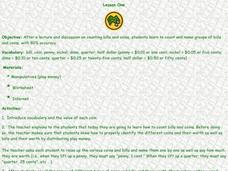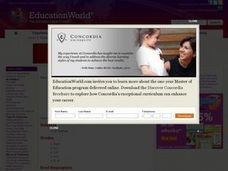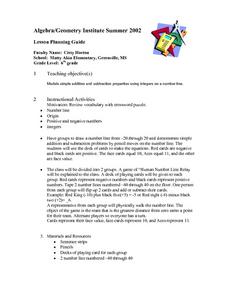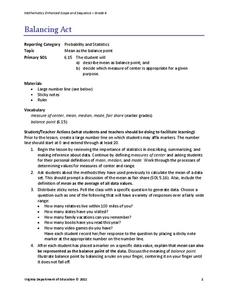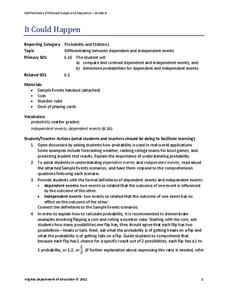Curated OER
Saving and Investing
Fifth graders participate in activities to promote understanding of investing and saving. In this saving and investing lesson, 5th graders design a portfolio, play a card game and write a skit about the importance of investing.
Curated OER
Number Chart and Number Line
First graders research strategies for identifying numbers through 100. In this number recognition lesson, 1st graders make games, create puzzles,and fill in missing numbers to practice number identification.
Curated OER
Smart- Counting Coins
Students discover the name and value of coins. In this counting money lesson, students identify heads and tails of coins and the value of each coin. Students visit websites and play games. Students then write a poem about money.
Curated OER
Counting Money
Students learn how to count money. In this money lesson, students review the names and values for each coin. Students learn how to count bills and coins and how to write amounts of money. Students complete web activities including a...
Curated OER
Lesson Four - Making Change
Students practice making change. In this money lesson, students complete worksheets in which they find the amount of change they would receive from a dollar bill amount. Students go online and play games on this same concept.
Pennsylvania Department of Education
Volume of Compound Figures
Fifth graders use patterns, models and relationships to solve equations. In this equations instructional activity, 5th graders define vocabulary for equations and complete worksheets explaining variables and solving problems.
Curated OER
Twist and Check Times Tables
In this math worksheet, students look for the solutions to the multiplication tables and use the game cards to complete the problems.
Alabama Learning Exchange
No More Money Trouble
Young consumers explore money identification and counting. In this cross-curricular money instructional activity, they participate in comprehension and writing activities prior to and after reading the book Money Trouble by Bill Cosby....
Curated OER
Playing with Remainders
Fifth graders explore how people handle remainders in real life. In this remainders math lesson plan, 5th graders participate in skits to show what to do with remainders. Students complete worksheets with word problems.
Alabama Learning Exchange
How Old Is That Tree?
Fifth graders study environmental changes by examining the annual rings of a cross-section of a tree trunk. They access websites to complete a worksheet on the parts of a tree. They count the annual rings on a tree slice while observing...
Curated OER
Mayor Puts City on Diet to Lose a Million Pounds
Students read a story called Mayor Puts City on Diet to Lose a Million Pounds and answer vocabulary and comprehension questions about it. For this current event Lose a Million Pounds lesson plan, students respond to literature by...
Curated OER
Telling Time: Two Ways to Read the Time
Second graders discuss the two different ways of reading time. They study the vocabulary "minutes to" and tell time in five minute intervals. They discuss why it is important to have schedules and students list some schedules that they...
Curated OER
Four Corner Fun: A Review Game
Twelfth graders practice academic skills by answering multiple choice questions. They role-play as fibbers or players and respond to questions accordingly, going to the A,B,C, or D corners of the classsroom. Fibbers can go to any corner.
University of Kansas
Newspaper in the Classroom
Newspapers aren't only for reading—they're for learning skills, too! A journalism unit provides three lessons each for primary, intermediate, and secondary grades. Lessons include objectives, materials, vocabulary, and procedure, and...
Curated OER
Roaming Robot
Look up! Turn left! This activity on giving and following verbal directions will excite your learners. A "finder" leaves the room while you and the class hides an object. When they return, students must use words on the cue cards...
EngageNY
Estimating Probabilities by Collecting Data
Take a spin to determine experimental probability. Small groups spin a spinner and keep track of the sums of the spins and calculate the resulting probabilities. Pupils use simulated frequencies to practice finding other probabilities to...
Curated OER
What's the Time 3 - Draw the Hands on the Clocks
In this telling time worksheet, students read the time words and draw the hands on the clocks to complete each problem. Students answer 6 exercises.
Curated OER
Understanding Place Value
Fifth graders study place value. After forming teams, they play a game called, "Who Can Line Up the Number." Students observe numbers in expanded form and place representative digits in the correct order.
Curated OER
Percentage War
Fifth graders explore fractions by participating in a card activity in class. In this percentages lesson, 5th graders inventory the amount of different cards in a deck in order to determine the percentages of getting a certain card....
Curated OER
Addition & Subtraction Properties With Integers
Sixth graders use a number line to solve addition and subtraction problems. In groups, they play a game of "Human Number Line Relay." They use a deck of cards to randomly create addition and subtraction equations and physically walk a...
Curated OER
Algebra/Geometry Institute Summer 2007: Graphing Activity
Seventh graders practice identifying coordinates by examining a city map. In this graphing lesson, 7th graders create coordinate directions on an index card and practice locating these locations on a grid. Students read and discover...
Virginia Department of Education
What's the Point?
Point your class in the right direction in plotting points with three activities that give scholars a chance to learn about and practice plotting points on a coordinate plane. They draw figures on the coordinate plane and list out the...
Virginia Department of Education
Balancing Act
How many different interpretations of the mean are there? Scholars place numbers on a number line and determine the mean. They interpret the mean as the average value and as the balance point.
Virginia Department of Education
It Could Happen
Understanding of probability will probably increase with the use of a refined resource. Pupils learn to distinguish between dependent and independent events as they calculate the probabilities of these types of events in various situations.





